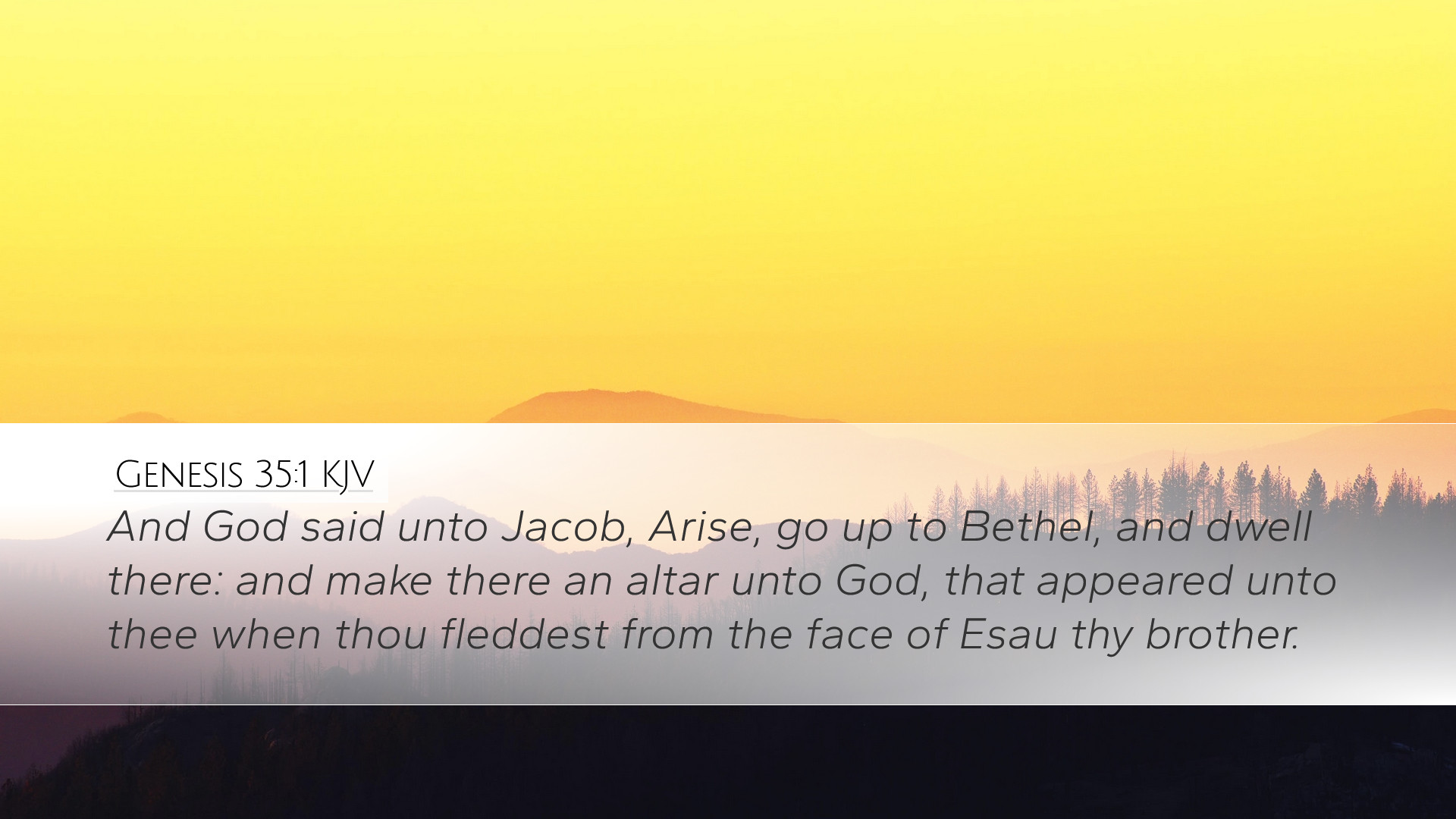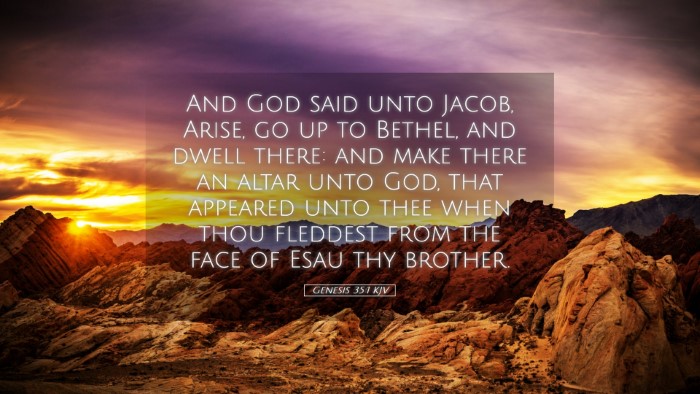Commentary on Genesis 35:1
Introduction: Genesis 35:1 is a pivotal verse that marks a significant moment in the life of Jacob. It reads: "Then God said to Jacob, 'Arise, go up to Bethel and dwell there; and make an altar there to God who appeared to you when you fled from the face of Esau your brother.'" This verse encapsulates themes of divine guidance, remembrance, and covenantal faithfulness, which have been elaborately discussed in various public domain commentaries such as those by Matthew Henry, Albert Barnes, and Adam Clarke.
Contextual Background
The context of this verse places Jacob at a critical juncture after a series of life-changing events, including his encounters with God and his tumultuous reunion with Esau. The command from God to return to Bethel where he first encountered the divine presence serves multiple purposes: it reinforces Jacob’s covenantal identity and calls him to a place of worship and remembrance.
Divine Command
- God's Initiative: God takes the initiative in directing Jacob to Bethel, showcasing divine sovereignty. This reflects how God guides His people, reaffirming the notion that they are never left to wander aimlessly.
- Call to Arise: The command to "arise" signifies the need for Jacob to take action in response to God’s instruction. It emphasizes a transition from a passive state to one of proactive obedience.
- Destination - Bethel: The choice of Bethel as the destination is significant. It is the place where Jacob first discovered the presence of the Lord. He is instructed to return to a site rich with spiritual heritage and divine encounters.
Theological Implications
- Covenantal Remembrance: Jacob is reminded of his covenant with God. The journey back to Bethel suggests the necessity of remembering and renewing one's commitment to God. This act of remembrance is crucial for spiritual development.
- Altar Building: The directive to build an altar signifies an act of worship and dedication. It is a gesture of gratitude and acknowledgment of God’s faithfulness. Altars in the Old Testament often represent a place of encounter with the divine.
- Divine Encounter: Jacob's return to the scene of his initial encounter with God symbolizes a re-engagement with his faith and a commitment to divine relationship. This echoes the narrative of many biblical figures who returned to previous altars as a means of renewal.
Insights from Commentaries
Matthew Henry's Commentary
Henry emphasizes the essential nature of divine instruction in a believer's life. He underscores Jacob's response to this unique communication from God and the importance of obedience in shaping one's spiritual journey. He comments on the necessity of revisiting places of divine encounter, suggesting that they serve as reminders of God’s promises and provisions.
Albert Barnes’ Notes
Barnes reflects on the significance of Bethel in Jacob’s life, noting it as the “house of God.” He elaborates on the necessity of place and memory in spiritual development, suggesting that returning to Bethel is both a literal and figurative journey back to foundational experiences in one’s relationship with God.
Adam Clarke’s Commentary
Clarke notes the importance of the altar as a significant symbol of worship, suggesting that building an altar reflects not only obedience but also a desire for a restored relationship with God. He highlights the importance of community in worship practices and advocates for a personal engagement with God through acts of devotion.
Practical Applications
- Importance of Obedience: This verse serves as a reminder for believers to remain attentive to God’s call. Obedience involves not just action, but also a heart aligned with God’s will.
- Revisiting Spiritual Milestones: Just as Jacob was urged to return to Bethel, so too should believers revisit significant spiritual milestones in their own lives. This may involve personal retreats, prayer, or times of reflection.
- Building Altars Today: In a modern context, building an “altar” may refer to creating spaces of worship, such as setting aside time for prayer and devotion, making worship integral to daily life.
Conclusion
Genesis 35:1 encapsulates a divine directive filled with rich theological significance and practical implications. The call to return to Bethel is not merely about geographic movement; it reflects the spiritual journey of remembrance, renewal, and reaffirmation of faith. As scholars, theologians, and pastors reflect on this verse, they are reminded of the ongoing need for divine guidance, the importance of worship, and the call to live in covenant faithfulness with God.


